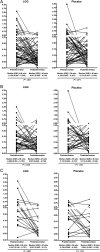Immune response and intestinal permeability in children with acute gastroenteritis treated with Lactobacillus rhamnosus GG: a randomized, double-blind, placebo-controlled trial
- PMID: 24501384
- PMCID: PMC3967829
- DOI: 10.1093/cid/ciu065
Immune response and intestinal permeability in children with acute gastroenteritis treated with Lactobacillus rhamnosus GG: a randomized, double-blind, placebo-controlled trial
Abstract
Background: Probiotics have a possible role in the treatment of pediatric acute gastroenteritis. We report the effect of the probiotic Lactobacillus rhamnosus GG (LGG) on intestinal function, immune response, and clinical outcomes in Indian children with cryptosporidial or rotavirus diarrhea.
Methods: Children with gastroenteritis aged 6 months to 5 years, testing positive for either rotavirus or Cryptosporidium species in stool (coinfections were excluded), were randomized to LGG (ATCC 53103) or placebo, once daily for 4 weeks. Baseline demographic and clinical details were obtained. Sera were tested for immunoglobulin G (IgG) and immunoglobulin A (IgA) antibodies to Cryptosporidium and rotavirus, and the lactulose to mannitol ratio for intestinal permeability was determined at baseline and at the end of follow-up.
Results: Of the 124 children enrolled, 82 and 42 had rotavirus and cryptosporidial diarrhea, respectively. Median diarrheal duration was 4 days; one-third of the children had severe diarrhea. Baseline and clinical parameters were comparable between children receiving LGG and placebo. At the end of follow-up, fewer children with rotavirus diarrhea on LGG had repeated diarrheal episodes (25% vs 46%; P = .048) and impaired intestinal function (48% vs 72%; P = .027). Significant increase in IgG levels postintervention (456 vs 2215 EU; P = .003) was observed in children with rotavirus diarrhea receiving LGG. Among children with cryptosporidial diarrhea, those receiving LGG showed significant improvement in intestinal permeability.
Conclusions: LGG has a positive immunomodulatory effect and may be useful in decreasing repeated episodes of rotavirus diarrhea. Improvement in intestinal function in children with rotavirus and cryptosporidial gastroenteritis emphasizes the role of probiotics in treating intestinal impairment after infection.
Clinical trials registration: CTRI/2010/091/000339.
Keywords: LGG; gastroenteritis; immune response; intestinal function; probiotics.
Figures


Similar articles
-
Probiotics in the treatment of acute rotavirus diarrhoea. A randomized, double-blind, controlled trial using two different probiotic preparations in Bolivian children.BMC Infect Dis. 2010 Aug 25;10:253. doi: 10.1186/1471-2334-10-253. BMC Infect Dis. 2010. PMID: 20735858 Free PMC article. Clinical Trial.
-
The effect of probiotics and zinc supplementation on the immune response to oral rotavirus vaccine: A randomized, factorial design, placebo-controlled study among Indian infants.Vaccine. 2018 Jan 4;36(2):273-279. doi: 10.1016/j.vaccine.2017.07.116. Epub 2017 Sep 2. Vaccine. 2018. PMID: 28874323 Free PMC article. Clinical Trial.
-
Lactobacilli and Bifidobacteria enhance mucosal B cell responses and differentially modulate systemic antibody responses to an oral human rotavirus vaccine in a neonatal gnotobiotic pig disease model.Gut Microbes. 2014;5(5):639-51. doi: 10.4161/19490976.2014.969972. Gut Microbes. 2014. PMID: 25483333 Free PMC article.
-
Rotavirus immunisation status affects the efficacy of Lacticaseibacillus rhamnosus GG for the treatment of children with acute diarrhoea: a meta-analysis.Benef Microbes. 2022 Oct 4;13(4):283-294. doi: 10.3920/BM2022.0024. Epub 2022 Aug 25. Benef Microbes. 2022. PMID: 36004717 Review.
-
Efficacy of Lactobacillus rhamnosus GG in treatment of acute pediatric diarrhea: A systematic review with meta-analysis.World J Gastroenterol. 2019 Sep 7;25(33):4999-5016. doi: 10.3748/wjg.v25.i33.4999. World J Gastroenterol. 2019. PMID: 31543689 Free PMC article.
Cited by
-
The effect of a novel anticonvulsant chemical Q808 on gut microbiota and hippocampus neurotransmitters in pentylenetetrazole-induced seizures in rats.BMC Neurosci. 2022 Feb 3;23(1):7. doi: 10.1186/s12868-022-00690-3. BMC Neurosci. 2022. PMID: 35114941 Free PMC article.
-
Emerging Technologies and Coating Materials for Improved Probiotication in Food Products: a Review.Food Bioproc Tech. 2022;15(5):998-1039. doi: 10.1007/s11947-021-02753-5. Epub 2022 Jan 30. Food Bioproc Tech. 2022. PMID: 35126801 Free PMC article. Review.
-
Effects of therapeutic probiotics on modulation of microRNAs.Cell Commun Signal. 2021 Jan 11;19(1):4. doi: 10.1186/s12964-020-00668-w. Cell Commun Signal. 2021. PMID: 33430873 Free PMC article. Review.
-
Clinical Evidence on the Health Benefits and Safety of Probiotic Lacticaseibacillus rhamnosus: A Systematic Review.Probiotics Antimicrob Proteins. 2025 Jul 11. doi: 10.1007/s12602-025-10646-8. Online ahead of print. Probiotics Antimicrob Proteins. 2025. PMID: 40643866 Review.
-
A combination of scGOS/lcFOS with Bifidobacterium breve M-16V protects suckling rats from rotavirus gastroenteritis.Eur J Nutr. 2017 Jun;56(4):1657-1670. doi: 10.1007/s00394-016-1213-1. Epub 2016 Apr 25. Eur J Nutr. 2017. PMID: 27112962
References
-
- Ajjampur SS, Sankaran P, Kang G. Cryptosporidium species in HIV-infected individuals in India: an overview. Natl Med J India. 2008;21:178–84. - PubMed
-
- Desjeux JF, Briend A, Butzner JD. Oral rehydration solution in the year 2000: pathophysiology, efficacy and effectiveness. Baillieres Clin Gastroenterol. 1997;11:509–27. - PubMed
Publication types
MeSH terms
Substances
Grants and funding
LinkOut - more resources
Full Text Sources
Other Literature Sources
Medical
Molecular Biology Databases
Miscellaneous

